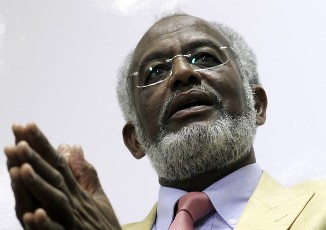Sudan says Iran offer of missile platforms came in wake of 2012 Israeli airstrike
May 30, 2014 (KHARTOUM) – The Sudanese foreign ministry has issued an explanatory statement on Friday regarding its minister Ali Karti’s, interview with the London based Al-Hayat daily newspaper on Thursday.

He was quoted as saying that this military platform “was intended to be directed against Saudi Arabia”.
But the ministry denied that Karti made such a statement.
“The minister said in the interview that after Israel’s attack on Al-Yarmouk arms factory in October, 2012 one of the many options which were presented was to build Iranian missile defence platforms on Sudan’s side of the Red Sea coast, noting the option was dismissed so as not to be misunderstood by some of the Gulf States,” the statement said.
Last October, Sudan accused Israel of conducting an airstrike on al-Yarmouk military complex in the capital Khartoum. However, the Jewish state, which sees the East African Muslim country as an ally of its top enemy Iran and a conduit of arms smuggling to the Hamas-controlled Gaza strip, has neither confirmed nor denied the reports.
The statement added that Karti did not mention in the interview that those missiles will be directed towards Saudi Arabia, underscoring he was talking about defensive platforms to protect the Sudan’s coasts not offensive ones to be directed against any other country.
In late 2012, Khartoum denied reports that it has approved an Iranian request for building a naval base off the Red Sea.
It is widely believed that Israel carried out at least two other airstrikes in eastern Sudan in 2009 and 2011 against targets believed to be involved in arms smuggling.
Last March, Israeli navy commandos seized a ship in the Red Sea off the Sudanese coast that was allegedly hiding Syrian-made M-302 surface-to-surface missiles supplied by Iran.
Since 2012, Port Sudan has become a regular stop for Iranian warships drawing concern by the US and its allies in the Gulf. Khartoum insists that its relations with Iran are based on common interests and not intended to threaten the interests of the Arab Gulf states.
The foreign minister has publicly expressed his opposition to the government’s decision to allow Iranian warships to dock in Port Sudan.
Karti reiterated over the last few weeks that Sudan’s ties with Iran would not come at the expense of its relations with neighboring Arab countries, pointing out that military cooperation between Sudan and Iran is not directed against any Arab country.
“This is not true, our relationship with Iran is very normal and below the level [you would expect] between two Muslim nations and particularly that Iran stood much with Sudan in all international forums and defended it a lot,” he told al-Hayat.
“But there is a minor need for Sudan in light of the security challenges facing the country , and we have said this over and over that Sudan benefits from its relationship with Iran in a limited way in the field of maintenance of some of the weapons produced by some Sudanese factories,” Karti added.
Arab Gulf states, and Saudi Arabia in particular, are understood to have been angered by the close links between Iran and Sudan.
(ST)
